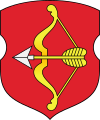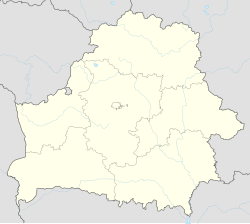Pińsk
|
Pinsk Пінск Пинск |
|||
|---|---|---|---|

The Assumption Cathedral in Pinsk.
|
|||
|
|||
| Location of Pinsk in Belarus | |||
| Coordinates: 52°07′N 26°06′E / 52.117°N 26.100°E | |||
| Country |
|
||
| Region | Brest Region | ||
| District | Pinsk District | ||
| Mentioned | 1097 | ||
| Area | |||
| • Total | 51.48 km2 (19.88 sq mi) | ||
| Elevation | 141 m (463 ft) | ||
| Population (2013) | |||
| • Total | 136,096 |
||
| Time zone | FET (UTC+3) | ||
| Postal code | 225700, 225710, 225716, 225745 | ||
| Area code(s) | +375 165 | ||
| License plate | 1 | ||
| Website | Official website | ||
Pinsk (Belarusian: Пі́нск, Pinsk; Russian: Пи́нск, Pinsk; Ukrainian: Пи́нськ, Pyns'k; Polish: Pińsk; Yiddish/Hebrew: Pinsk ,פינסק, Lithuanian: Pinskas) is a city in Belarus, in the Polesia region, traversed by the river Pina, at the confluence of the Strumen and Pripyat rivers. The region was known as the Marsh of Pinsk. It is a fertile agricultural center. It lies south-west of Minsk. The population is about 130,000. The city is a small industrial center producing boats sailing the local rivers.
The historic city has a restored city centre full of two-story buildings dating from the 19th century and the beginning of the 20th century. The city centre has become an active place for youth of all ages with summer theme parks and a newly built association football stadium that houses the town's football team, FC Volna Pinsk.
Pinsk is first mentioned in the chronicles of 1097 as Pinesk, a town belonging to Sviatopolk of Turov. The name is derived from the river Pina. Pinsk's early history is closely linked with the history of Turov. Until the mid-12th century Pinsk was the seat of Sviatopolk's descendants, but a cadet line of the same family established their own seat at Pinsk after the Mongol invasion of Rus in 1239.
...
Wikipedia



